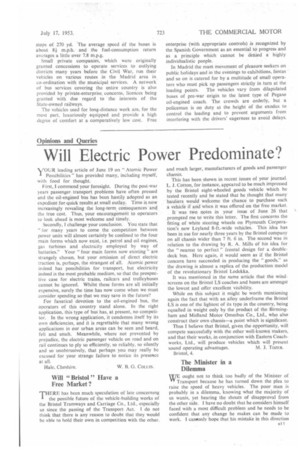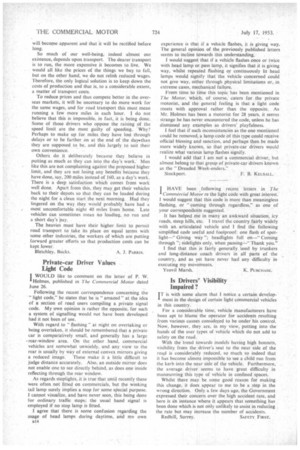The Minister in a Dilemma
Page 47

Page 48

If you've noticed an error in this article please click here to report it so we can fix it.
wE ought not to think too badly of the Minister of " Transport because he has turned down the plea to raise the speed of heavy vehicles. The poor man is probably in a dilemma, knowing what the majority of us wants, yet hearing the shouts of disapproval from the other side. I have no doubt that he considers himself faced with a most difficult problem and he needs to be confident that any change he makes can be made to work. I candonlv hope that his mistake in this direction
will become apparent and that it will be rectified before long.
So much of our well-being, indeed almost our existence, depends upon transport. The dearer transport is to run, the more expensive it becomes to live. We would all like the prices of the things we buy to fall, but on the other hand, we do not relish reduced wages. Therefore, the only logical solution is to keep down the costs of production and that is, to a considerable extent, a matter of transport costs.
To reduce prices and thus compete better in the overseas markets, it will be necessary to do more work for the same wages, and for road transport this must mean running a few more miles in each hour. I do not believe that this is impossible, in fact, it is being done. Some of those drivers who oppose the raising of the speed limit are the most guilty of speeding. Why? Perhaps to make up for miles they have lost through delays or to be farther on at the end of the day•than they are supposed to be, and this largely to suit their own convenience.
Others do it deliberately because they believe in putting as much as they can into the day's work. Men like this are not complaining against the proposed higher limit, and they are not losing any benefits because they have done, say, 200 miles instead of 160, as a day's work. There is a deep satisfaction which comes from work well done. Apart from this, they may get their vehicles back to their depots so that they can be loaded during the night for a clean start the next morning. Had they lingered on the way they would probably have had a most uncomfortable night 40 miles from home. Late vehicles can sometimes mean no loading, no run and a short day's 'pay.
The heavies must have their higher limit to permit road transport to take its place on equal terms with some other industries, the workers of which are putting forward greater efforts so that production costs can be kept lower.
Bletchley. Bucks. A. J. PARRIS.
experience is that if a vehicle flashes, it is giving way. The general opinion of the previously published letters seems to incline towards this understanding.
I would suggest that if a vehicle flashes once or twice with head lamp or pass lamp, it signifies that it is giving way, whilst repeated flashing or continuously lit head lamps would signify that the vehicle concerned could not give way, either through physical limitations or, • in extreme cases, mechanical failure.
From time to time this topic has been mentioned in The Motor, which, of course, caters for the private motorist, and the general feeling is that a light code meets with approval rather than the opposite. As Mr. Holmes has been a motorist for 28 years, it seems strange he has never encountered the code, unless he has dismissed any examples as drivers' playfulness.
I feel that if such inconsistencies as the one mentioned could be removed, a lamp code of this type could receive official blessing and sanction, and perhaps then be made more widely known, so that private-car drivers would realize what various lamp flashes signify.
I would add that I am not a commercial driver, but almost belong to that group of private-car drivers known as the "Dreaded Week-enders."
Stock port. F. B. KELSALL.
I HAVE been .following recent letters in The 'Commercial Motor re the light code with great interest. I would suggest that this code is more than meaningless flashing, or "coming through regardless," as one of your correspondents suggested.
It has helped me in many an awkward situation, icy roads, steep hills, etc. I travel the country fairly widely with an. articulated vehicle and I find the following simplified code useful and foolproof: one flash of spotlight—" Giving way "; headlights full on—" Coming through "; sidelights only, when passing" Thank you." I find that this is fairly generally used by trunkers and long-distance coach drivers in all parts of the country, and as yet have never had any difficulty in executing my movements.
Yeovil Marsh. K. PURCHASE.




















































































